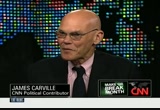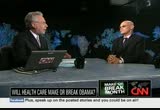tv Larry King Live CNN August 12, 2009 12:00am-1:00am EDT
12:00 am
see you again tomorrow. you can see all the most recent shots at our website at 360.com. that does it for this ex-of "360." thanks for watching. "larry king live" starts right now. tonight, the frightening in-your-face battle over health care reform. >> i don't want this country turning into russia, turning into a socialized country. >> fierce and fired up, crowds are held back to keep them from coming to blows. is this a life and death struggle for the old, the sick, and the poor? or a political controversy that's too hot for the president to handle? >> you will not be waiting in any lines. this is not about putting the government in charge of your health insurance. >> will health care reform make or break barack obama?
12:01 am
then, as senator ted kennedy fights for his life, his sister eunice kennedy shriver passes away. america's most famous family mourns once more. next on "larry king live." welcome to "larry king live," i'm wolf blitzer sitting in for larry tonight. we've got an outstanding panel. a full discussion beginning with president obama's number one priority right now, health care reform. is it going to happen? joining us, james carville, the cnn contributor and democratic strategist. also joining us, ben stein, the economist and attorney, once was a speech writer for presidents nixon and ford. as you know, he's also a tv personality and actor. and joining us from las vegas, penn gillette, the illusionist, the best-selling author. he's the taller, more talkative half of penn & teller. they're performing, by the way, at the rio hotel and casino in
12:02 am
las vegas. their program "b.s." is now in its seventh showtime series. he's a libertarian, as a lot of our viewers know. guys, thanks very much for coming in. the president was in new hampshire at a town hall forum today making his case for health care reform, and among other things he said this. >> under the reform we're proposing if you like your doctor you can keep your doctor. if you like your health care plan, you can keep your health care plan. you will not be waiting in any lines. this is not about putting the government in charge of your health insurance. i don't believe anyone should be in charge of your health insurance decisions but you and your doctor. >> all right, james carville, what does he need to do right now to win this fight? >> well, you know, he's going on the road, obviously, a lot of misconceptions out there to say the least. what i thought was interesting about today is the president of the united states always does a good job. he was knowledgeable. people were very nice, as they generally are.
12:03 am
i saw the woman in pennsylvania talking about i don't want to be russia on television. i saw more of senator mccaskill, more of senator specter than i did. and what's happened, it seems, that the debate at least is the president's trying to get back some kind of control of it because now it's people that are showing up at the town hall meetings and the more they get on television the more they're going to show up so they can get on television. but this is the interesting thing that's going on. >> his town hall was pretty receptive, pretty friendly compared to senator specter or senator mccaskill. >> that happens when a president goes out. if people are disrespectful to the president and probably also if somebody started screaming or pulling that, the secret service gets very, very itchy about something like that around the president. but the point is these protests, people are finding out that you can get a lot of air time by being very loud and belligerent, and i think that's part of what's going on here.
12:04 am
this debate does seem to be g getting pretty passionate. >> well, there's a lot of anger out there, ben stein, and a lot of folks simply are scared. >> well, they are scared. the real question is this. we all can stipulate we want to have americans in good health. nobody wants an american who wants health insurance and cannot afford it to die from a disease or from an injury. richard nixon, for whom i worked, put up to congress, sent up to congress the first national health insurance program. i wrote the message sending it up when i was a 29-year-old kid. so republicans want people to be cared for too. the question is, how are we going to do it? where is the money going to come from? are we going to have a department of motor vehicles bureaucrat whom we call a health bureaucrat for this purpose standing between you and your doctor? there are a lot of unanswered questions. president obama says the government is not going to take over your health care plan. buried deep in the bill, there's a provision that says within a few years the government will be able to revise all private health care plans and change them to suit government specifications. so it means you won't be able to
12:05 am
have your health care plan anymore. the whole subject is fraught and very, very scary. i don't know why president obama thinks that after six months in office he is uniquely qualified to solve it. it seems he does not need to be rushing into something that is so emotionally fraught and so scary. >> well, on that point, penn, he did win the election. there's a decisive democratic majority in the senate and the house, and a lot of folks think he has a mandate from the american public to improve the nation's health care system. >> well, you know, i'm always interested in protecting the minority, the people who don't go with the mainstream, and the idea of the united states, to me, is to protect the individuals who are outsiders. and i think when you have the president winning, he did not win by 100%, he has not got a mandate from everybody. and protecting the rights. and the idea of limited government, i think, is very, very important.
12:06 am
and a government that can do all this for you, as has been said many times before, can also take everything away. and i think there's an issue of just how much power the government has very separate from whether they'll do a good job or a bad job pragmatically. >> hold on for a second. because in contrast to the president's forum in new hampshire, there was acrimony at two other forums involving two democratic senators -- senator specter of pennsylvania and senator mccaskill of missouri. listen to this. >> you want to be led out of here? you're welcome to go. now, wait a minute -- now, wait a minute. >> i don't understand this rudeness. what is this? beg your pardon? you don't trust me? >> i'm sick of the lies. i don't like being lied to, i don't like being lied about. this administration is doing both of those things. >> hey, hey, hey!
12:07 am
okay. ma'am? okay. everybody sit down. everybody sit down. >> she was having an especially tough time out in missouri. senator mccaskill. james, those are the images you're going to see on television because it's extraordinary what's going on. >> well, yes, i'm going to say, you're seeing on television. look, on campbell's show, this health commissioner czar. no, it's not, it's somebody who sort of oversees the insurance -- people are saying keep the government off my medicare or there are going to be these death panels and this kind of stuff. if this thing goes down and it is perceived that it went down because people were lying about what was in there, as this guy pointed out, then there's going to be anger from -- >> is that conceivable to you? that this president with the majorities that the democrats have in the senate and the house will not get something passed? >> i think he will get something.
12:08 am
but you know, who knows? you know, because -- who knows for sure what's going to happen? i think he will, but this thing people need to also take -- 60% of bankruptcy in this country is a result of health care costs. i mean, i could go on and on. health care premiums double. there are people that say oh, gee, wait i little longer, you don't want to rush into this thing. and i think president roosevelt started this in 1937. president truman tried. as ben pointed out, president nixon tried. certainly president clinton did. and the argument's always the same. no, it's too complicated, we need to pull back and wait a little bit longer. there are a lot of people out here that this is -- this is a really major issue and needs to be addressed. >> guys, stand by for a moment. ben stein, penn jillette, we're going to bring you back in. our controversy over this health care reform legislation. our coverage of it will continue on "larry king live" right after this.
12:11 am
we're back with james carville, ben stein, and penn jillette. ben stein, does the country need health care reform right now? >> well, it needs health care reform, that's for sure. but we do not want to have a single american dying or being in pain or being injured or having some chronic complaint. if we as taxpayers or we as fellow citizens and brothers under god can help him or her. but how do you do it? i mean, health care is a terrifying subject. raising taxes is a terrifying subject, big government is a terrifying subject, intrusion
12:12 am
into our private lives is a big subject. government control over our lives is a big subject. these are terrifying subjects. we know that president obama, i'm sure he's doing this with a good heart, is telling us a big lie when he's saying government can cut a huge cost out of health costs. it cannot be done without rationing. cannot be done without either drastically cutting medical or nursing pay or drastically cutting the amount of medical care available to us. so something's got to give. it's either going to be a kind of socialistic government that takes everything eventually, or there's going to be some other solution. but it's a terrifying subject. i mean, i have to say, you know, i'm in chicago because i'm here for the funeral of john hughes. this was a man with unlimited financial resources, incredibly, unbelievably smart, even he couldn't get perfectly adequate health care. with all his resources. how is it going to be done? >> he's the great -- he was the great film director. >> a great man. >> "ferris bueller's day off," when a lot of us got to know you. penn jillette, there are 45 million americans who have no health insurance right now. this is unlike any other
12:13 am
industrialized society in the world right now. what should the u.s. be doing about that? >> well, you know, all these numbers, the 45 million, some of these people are perfectly healthy people who are moving through a phase and choosing not to have health care. but the whole idea that the bad guys are using scare tactics and all of this stuff from the president about you're not supposed to be frightened by, you know, killing grandma for rationing and so on. but then obama uses anecdotal arguments saying, you know, this woman had hepatitis c, this woman's internal organs are not covered. anecdotal is not the right argument either. i think someone should be taking the high road and talking about the philosophical and moral issues about this. and i would also like to say -- >> what is the philosophical and moral issue? what responsibility does society as a whole have for everyone having access to health insurance? >> that's not the question.
12:14 am
the society as a whole has complete responsibility for everyone in that society. the question is, how much should government be involved? and the one thing that's really bad about any system like ours, which is the best system possible, is that you often end up doing compromise. and even if you have a good idea here and a good idea here, the middle can be very, very bad. and what you've got in 1,000 pages, i haven't read all of it, is the worst of both worlds. you have the worst part of a government controlling it and the worst part of private -- >> those 1,000 pages, james, that's the house version of what's going on. it's detailed. it's complex. it's hard to get through. god knows i've tried. i'm sure you have as well. was it a mistake for the white house to defer, to punt to congress and let them craft this legislation as opposed to doing what bill clinton and hillary clinton did in '93 and '94? they crafted the legislation, congress eventually rejected it, but should the obama
12:15 am
administration have come up with a plan and then tried to sell it to congress? >> if this works and they get a bill out, people say this was really smart and rahm emanuel -- if it fails it will be really stupid. if it works, it works. the real truth of the matter is, we spend twice as much percentage of our gdp on health care than any other country in the world. and by almost -- it'd be hard to come up with any measure that we outperform other countries on health care. so at some logic tells you that if we're spending twice as much as anybody else in the world and they're getting -- and other industrialized countries like us are getting better results, maybe we ought to try to change something here. but to get back to your question is, if they're successful, they'll be geniuses. if they're unsuccessful, they'll be idiots. and that's the way -- and thus it was, thus it is, thus it shall be. >> is it going to be waterloo -- as one senator, jim dement, of
12:16 am
12:17 am
the town halls about health care are being called town hells by some. they've degenerated into shouting and shouting down. take a look at more from senator specter's meeting in lebanon, pennsylvania. and the president's response in new hampshire. >> i'm not a lobbyist with all kinds of money to stuff in your pocket so that you can cheat the citizens of this country. so i'll leave and you can do whatever the hell you please to do. one day god's going to stand before you, and he's going to judge you. and the rest of your damn cronies up on the hill. and then you'll get your just desserts. >> there's been a long and vigorous debate about this. and that's how it should be.
12:18 am
you know, that's what america's about. is we have a vigorous debate. that's why we have a democracy. but i do hope that we will talk with each other and not over each other. >> i will be back with james carville, ben stein, and penn jillette right after this. i feel like i have to wind myself up just to get out of bed. then...well... i have to keep winding myself up to deal with the sadness, the loss of interest, the trouble concentrating, the lack of energy. if depression is taking so much out of you, ask your doctor about pristiq®. (announcer) pristiq is a prescription medicine proven to treat depression. pristiq is thought to work by affecting the levels of two chemicals in the brain, serotonin and norepinephrine. tell your doctor right away if your depression worsens or you have unusual changes in mood, behavior, or thoughts of suicide. antidepressants can increase suicidal thoughts and behaviors in children, teens and young adults. pristiq is not approved for children under 18. do not take pristiq with maois.
12:19 am
taking pristiq with nsaid pain relievers, aspirin, or blood thinners may increase bleeding risk. tell your doctor about all your medications, including those for migraine, to avoid a potentially life-threatening condition. pristiq may cause or worsen high blood pressure, high cholesterol, or glaucoma. tell your doctor if you have heart disease... or before you reduce or stop taking pristiq. side effects may include nausea, dizziness and sweating. (woman) for me, pristiq is a key in helping to treat my depression. (announcer) ask your doctor about pristiq. sfx: coin drop, can shaking when you own a business, saving sounds good. so hear this: regions makes it simple to save money and time with lifegreen checking and savings for business, free convenient e-services and regions quick deposit, so you can deposit checks right from your desk.
12:20 am
so switch to regions and start saving. plus, get a business financial review through a regions cashcor analysis. it's how business gets into the rhythm of saving. regions - it's time to expect more. at a town hall in new hampshire, the president recalled earlier efforts to try to get health care reform enacted. >> every time we come close to passing health insurance reform, the special interests fight back with everything they've got. they use their influence, they use their political allies to scare and mislead the american people, they start running ads. this is what they always do.
12:21 am
we can't let them do it again. not this time. not now. >> do you have a problem, ben stein, with special interests lobbying for their special interests? >> absolutely not, that's what the government's all about, that's what everything's all about. president obama's group is a special interest. everybody's a special interest. the whole meaning of free speech is that special interests are allowed to tell their side of the story. and after president obama's administration is loaded with lobbyists and ex-lobbyists. he's got lobbyists now all over town kissing up to him. so i don't know what his complaint is about lobbyists. but look, here's the situation. medicare is breaking this country's bank. it's going to make us broke eventually. now we're going to basically put the whole country on medicare eventually. how are we going to pay for all that? that's one giant problem. i've got another issue. he's knocking, knocking, knocking the drug companies and saying a lot of these savings are going to come out of the drug companies. look, i agreerks drugs are incredibly expensive. prescriptions, i should say, are incredibly expensive. mind-bogglingly expensive. but they also save lives.
12:22 am
i don't want the drug companies, the prescription drug companies, to be tortured so they don't have enough money to make our life-saving drugs for us. let's find some other way to get the money than torturing it out of the drug companies. >> penn, you're a libertarian. what do you hope emerges from all this? >> well, the one thing i like, perhaps this is awful to say. one thing that's really good is the people not trusting the government. i always like that. and obama, who i think his heart is in the right place, i think he's a brilliant speaker and very, very smart, but i don't want the country to be worshipping everything he says, and seeing the country be very skeptical of the president i think is always a good thing. >> i was going to say to james, if he fails right now, will senator demint be right, this will be his waterloo? >> i'm always reminded of one of my favorite -- i'm a sports fan like you are. they scad dwayne thomas, running back for the dallas cowboys, the day before the super bowl.
12:23 am
he asked the reporter, if it's the ultimate game, how come we play it again next year? this is the end of it, you know. we come back and, you know, we come back and, you know, napoleon even came back after waterloo. >> i'm interested in making a turn to hillary clinton. she's in africa doing very important work. she's fighting for women's rights in africa right now, but she did have this exchange with a university student the other day in africa as well. i'm going to play it for our viewers. >> what does mr. clinton think through the mouth of mrs. clinton? and what does mr. motomo think on this situation? thank you very much. >> wait, you want me to tell you what my husband thinks? my husband is not the secretary of state. i am. so you asked my opinion.
12:24 am
i will tell you my opinion. i'm not going to be channelling my husband. >> we now know that the translator mistranslated the question. the questioner wanting to get her thoughts about what president obama thinks, not what former president clinton thinks. james, you know mrs. clinton about as well as anyone. it did sort of strike a raw nerve there. you could see she was irritated. >> she seemed a mite peeved there. but yes, anybody, if i said through the mouth of mrs. blitzer, would you tell me what wolf blitzer thinks, i probably wouldn't get a very good reaction. >> it wouldn't be that scary. it wouldn't be as scary as that. that's scary. >> i don't think that was -- she was dealing with -- they have terrible problems with female mutilation in that country. she was probably, you know, a little bit -- and so she gets this question. and people say you know what, i wish these politicians would not be so scripted and so stilted
12:25 am
and so everything, and had she not reacted like that people would say, well, gee, you're the secretary of state and somebody asks you what your husband thinks -- i think that what she said was understandable. and i think it shows a kind of human side of her. and i'm fine with that, i'm crazy about it. look, i love her. so i wouldn't criticize her. >> let ben and penn weigh in on mrs. clinton as well. stand by, guys, hold your fire. we're going to take another quick break. can i tell you what a difference phillips' colon health has made? it's the probiotics. the good bacteria. that gets your colon back in balance. i'm good to go! phillips' colon health.
12:26 am
12:27 am
12:28 am
welcome back to "larry king live." i'm wolf blitzer, sitting in tonight for larry. ben stein, do you think secretary clinton is doing a good job? >> well, before i say that, i've always wondered how democrats got to be democrats. obviously not from reading history. napoleon did not come back from the bath of waterloo. he was exiled to st. helen. and he died there miserable and alone. so democrats, read your history. second thing is, i think senator clinton was suffering from jet lag, god bless her, she was trying her best to give a good answer to a ridiculously insulting question. she's my law school classmate, and i love her and i think she does a good job, alth think she's got a lot of insoluble problems on her hands. >> and she was in congo today doing important work, where women are being raped and mutilated. >> terrible. >> penn, i think you'll agree with your colleagues here tonight, she's been impressive so far. >> well, yeah, but i wanted to ask a favor of james. because he knows hillary clinton. if by any weird chance, one in a
12:29 am
billion chance i'm ever in a room with hillary clinton and i start to say something that's going to get her that mad at me, do anything you have to to get me out of the room. i mean, throw a blanket over me, throw me out, shoot me, i just could not stand anyone yelling at me like that. >> i've been yelled at worse than that. >> i know you have. i haven't. you have -- protect me, please, i'm begging you. >> look, you can't -- she got testy. i don't know if that was like -- i don't want to make it into -- as i said, she was a mite peeved. she was testy. she sort of reacted in a certain way, if you will. >> oh, i think it was justified. >> i think it was -- >> it's not like -- i didn't have the sense like she was like, well -- she was testy. and she said you ask me what my husband thinks. i mean, i wouldn't exaggerate it into anything more than it is. >> she was 100% right. she was 100% right. still frightening. >> and i got the impression, and i think you'll agree, as well,
12:30 am
you know, this guy -- this mistranslation. was interested in what did her husband think. but what does another african president, a male, think, and she's saying to herself, what am i, chopped liver? she's got opinions on this. and she is the secretary of state after all. a quick -- >> what am i, chopped liver? would have been a better answer. >> and jet lag. here we have another example of jet lag. these important people travel all around the world, they get exhausted, they get jet lagged, it's hard for them to keep their sense of humor. i think this is very much part of the story with the professor at harvard who was mistreated by the police. people get jet lagged, too much traveling especially by high-ranking government officials. they've got to rest more. i mean, the work they do is just too tiring. >> he's absolutely right. guys, i want everybody to watch this clip from one of the great movies of all time. >> adams? >> here. >> adamly? >> here. >> adamowski? adamson? >> here. >> adler? >> here.
12:31 am
>> anderson? anderson? >> here. >> bueller? bueller? bueller? bueller? >> he's sick. my best friend's sister -- >> ben stein, obviously, that was you. you spoke today at the funeral of john hughes, the director of that film and several other really excellent films. give me your thought. he was only what? 59 years old? >> 59 years old and i'm sure he had a wonderful super good doctor but even that doctor didn't find this undiagnosed heart condition that laid him low at 59. he was the poet of human exultation, the poet of happiness, i have a lot of friends in iraq, one of them in particular told me after john hughes died all we wanted to do after we'd go out on a tour, a patrol in 130 degree heat, getting shot at, getting bombed, rocketed, mortared, is watch "ferris bueller's day off" so we
12:32 am
know, so we know there's a better life waiting for us. that was -- john hughes showed us the best of the human condition. no rapes, no violence, no f bombs. just human beings exultant. god bless him. he is much missed. >> he wrote and directed "the breakfast club," "16 candles," "wro and produced "pretty in pink." "something wonderful." >> "planes, trains and automobiles." as good as "death of a salesman." >> what was that underlying heart condition that he obviously was not diagnosed with? >> i don't know what it was. but a person doesn't just suddenly die at age 59 walking down the street if he didn't have some kind of serious heart problem. dy mred m, i assume, he died of some kind of heart condition. and what i was saying earlier is even this person, who was a genius, a genuine genius, very self-aware, access to any kind of health care he wanted, even that wasn't discovered. so there's not going to be perfect health care for everybody for a long, long time. but the main thing i want to say is this is a man who was a
12:33 am
wonderful lover of mankind and he will be much missed. >> yeah. i totally agree. loved those movies, especially "ferris bueller's day off." guys, thanks very much. james carville, ben stein, penn jillette, all talented in their own right. we're going to continue our discussion of what's going on with health care reform in the united states, including a conversation with president obama's former personal physician for 20 years. guess what? he disagrees with the president. so, what's the problem?
12:34 am
12:35 am
well with us, it's the same flat rate. same flat rate. boston. boise? same flat rate. alabama. alaska? with priority mail flat rate boxes from the postal service. if it fits, it ships anywhere in the country for a low flat rate. dude's good. dude's real good. dudes. priority mail flat rate boxes only from the postal service. a simpler way to ship.
12:36 am
we're back on "larry king live," i'm wolf blitzer sitting in tonight for larry. joining us now, dr. david shiner of chicago. he's a member of physicians for a national health program, which supports a single payer national health insurance program. he was barack obama's personal physician in chicago for more than two decades. also joining us, dr. dean ornish, the founder and president of preventive medicine research institute. he's the medical editor at huffingtonpost.com. and congressman ron paul, republican of texas, former republican presidential candidate. he himself is an m.d., was a flight surgeon in the u.s. air force, later an ob-gyn in civilian practice. gentlemen, thanks to all of you for coming in. let me play for you what president obama said today about a so-called singer-payer system. >> i'm not promoting a single payer plan. i am promoting a plan that will
12:37 am
assure that every single person is able to get health insurance at an affordable price and that if they have health insurance, they are getting a good deal from the insurance companies. that's what i'm fighting for. >> dr. shiner, you're disappointed in your old friend, your patient president obama, because you want a single payer system along the lines of what the system in britain or in canada, is that right? >> yes. my legitimacy is not just that i took care of president obama. i have a huge practice. i see between 4,000 and 5,000 patient visits a year. 80% of my patients are in single payer. the federal government has never in the 40 years i've dealt with medicare, never interfered with the care of my patients. this constant myth that government will get between the patient and the doctor, it is an absolute myth. the insurance companies are constantly in our way, constantly interfering. i lost a patient yesterday who had to leave me because she didn't have the right kind of insurance.
12:38 am
the cost of private health insurance administration is $400 billion a year. if we had a single payer, that would be eliminated, the 50 million or 48 million could be covered just by that saving alone. continuing private health insurance is crazy. the private health insurance companies have not shown us they can be trusted. why do we keep coming back and asking them to -- that we can trust them? and the pharmaceutical companies, why aren't we buying in bulk and negotiating the prices of the drugs? the rest of the world looks upon us with disdain. we are 37th in the world in health statistics. even slovenia is ahead of us. and as carville said, we pay twice as much as our nearest competitor. this is insane. >> let's ask congressman paul to respond. i suspect you disagree. >> yes, i do. we have a one payer system with medicare, and we have -- it's broke. and so that's part of the problem we have today. everybody agrees we have reform.
12:39 am
but where i find we're missing the boat is the definition of what we're doing. for some reason i think it's the fact that 35 years ago we introduced the notion of managed care based on the fact that people thought they have a right to medical care. i don't accept that. because if you do, that means the majority can vote to demand anything they want from the minority in a free society, you're supposed to protect the minority not the majority. but then also, this idea of insurance, i keep using this issue of insurance, it doesn't even conform to the definition of insurance. insurance is something that measures risk. the medical insurance does not measure risk. they want paid insurance -- they want paid services. what if we tried to pass out food in this manner? it absolutely wouldn't work. but the real key to this is not a whole lot of people are totally upset with the medical care system. what they're upset with is the cost. nobody's really talking about why the costs are high. huh inflation -- >> let me let dr. --
12:40 am
>> you need tort reform. tort is one thing. we don't have competition. we're not allowed to sell these insurance policies across state lines. so there's a tremendous amount. let me tell you, you're never going to solve the problem of high cost of medical care if you don't solve the problem of inflation. and that's coming down the road. >> dr. ornish, weigh in. the president's having a tough enough time getting a public option, a government-run health insurance agency to compete with the private health insurance companies, let alone a single-payer system. realistically, what do you hope for, dr. ornish? i know you've done a lot of work in preventive medicine. >> well, thank you for the chance to be here. i have great respect for president obama, and i agree we need universal coverage, but i'm deeply suspicious of single payer. it sounds great in theory, but i think the founding fathers had it right. when you have too much power concentrated in one player, whether it is what happened with the bush administration with the executive branch taking on too much power or some of the large
12:41 am
corporations that misuse it or what happens with medicare -- it took us 14 years of medicare just to get them to cover intensive lifestyle intervention. i think we're asking the wrong -- it's a false choice here. the real issue is that the problem with health reform is that it's focusing way too much on who's covered, the 48 million which we need to do, but not enough on what's covered. we pay for -- if we just do more bypass surgery and angioplasty and drugs and so on on 48 million more people, then costs go up exponentially. that's when we have these painful choices like raising taxes, letting the deficit go up. that's threatening the viability of health reform. but what we found in our studies is lifestyle cannot only be prevention, it can be treatment. 3/4 of the $2.1 trillion in health care costs are sick care costs. it goes for four diseases. heart zaerdisease, diabetes, br or prostate cancer, and obesity. all of which we found out only can be prevented but even reversed by changing lifestyle at a fraction of the cost. >> i believe, dr. scheiner, you probably agree as well.
12:42 am
you've got to do exactly what dr. ornish is saying. deal with preventive medicine sow don't have to do these expensive complicated procedures, you prevent people from getting sick in the first place. but given the current political environment in washington, dr. scheiner, do you see any possibility that even if president obama wanted a single-payer system, what canada has or britain has or france has, that he could politically get it through? >> well, you know, the question is, right now there are 89 representatives in the house that support single payer. 60% of physicians support single payer. my organization, there's 16,000 physicians who are fighting for single payer. the question is, i don't think the public has been adequately informed as to what single payer is. it has been so demonized. medicare works. now, why is medicare expensive? because it takes care of old sick people. if it was universal, the cost would be spread out. if the administrative costs were lowered, we would be able to afford it.
12:43 am
i don't know why people are so frightened. a national health insurance doesn't mean that we have socialized medicine. we have private doctors, free choice. patients do not have free choice today. they have to go to the doctor their insurance company says. they have to go to the hospital, the laboratory. the medication constantly changes because they tell us it's not in their formulae. i want the public to have freedom of choice. single payer gives it. i don't know why -- >> all right. hold your thoughts, guys, for a moment. because we're going to take a quick break. we're going to continue this important conversation right after this.
12:44 am
do you have health insurance? that's tonight's quick vote question. go to cnn.com/larryking. cast your ballot. the anger and aggression at today's town hall meetings were especially apparent in pennsylvania. here's more of the sound and the fury directed at senator arlen specter. >> what are you going to do to restore this country back to what our founders created
12:45 am
according to the constitution? >> if you guys think that we want health care reform so bad, do this. let's have a referendum in 2010. we'll tell you if we like your plan or not. how's that work? >> if the money runs out in this program like it did in the cash for clunkers in four days, where is this money going to come from? >> i do not want to pay on a health care plan that includes the right for a woman to kill her unborn baby. is this true that this plan is in the health care bill? >> leave us alone. that's all we would ask. would you leave us alone? >> as a 74-year-old man, if you develop cancer, we're pretty much going to write you off. because you're no longer a working citizen who will be paying taxes. >> well, you're just not right. nobody 74 is going to be written off because they have cancer. that's a vicious, malicious,
12:46 am
untrue rumor. >> senator specter responding to some of his constituents in pennsylvania. we'll be right back with our three physicians. (announcer) take your time to find the right time with cialis for daily use... a clinically proven, low-dose tablet for erectile dysfunction you take every day so you can be ready anytime the moment is right. tell your doctor about your medical condition and all medications and ask if you're healthy enough for sexual activity.
12:47 am
don't take cialis if you take nitrates for chest pain, as this may cause an unsafe drop in blood pressure. don't drink alcohol in excess with cialis. side effects may include headache, upset stomach, delayed backache or muscle ache. to avoid long term injury seek immediate medical help for an erection lasting more than 4 hours. if you have any sudden decrease or loss in hearing or vision stop taking cialis and call your doctor right away. (announcer) 36-hour cialis. or cialis for daily use. ask your doctor about cialis today, so when the moment is right, you can be ready.
12:48 am
good choice. only meineke lets you choose the brake service that's right for you. and save 50% on pads and shoes. meineke. john roberts sitting in for anderson cooper tonight on "ac 360" coming up at the top of the hour. john, what's on tap? >> wolf, thanks. coming up on "360" at the top of the hour, we're digging deeper into the health care debate tonight. not only letting you listen at length to president obama's town hall meeting, but we're also keeping them honest. getting beyond the yelling that seems to be so popular at these events and actually answering some of the concerns out there, real answers from our own dr. sanjay gupta. also tonight, dr. conrad murray still in the spotlight.
12:49 am
investigators today searching the las vegas pharmacy used by michael jackson's doctor, a place that cnn sources say sold dr. murray the powerful anesthetic propofol that many believe might have contributed to jackson's death. all that, plus an american soldier in texas arrested for murder and accused of being an assassin for a mexican drug cartel. it's a shocking story that we'll tell you about coming up at the top of the hour. we'll see you then. wolf? >> we'll see you at the top of the hour. and "american morning" tomorrow morning. >> thanks for reminding me, wolf. >> get some sleep afterwards. let's talk a little about some of these advocacy ads that have been running, especially those suggesting that seniors are going to be especially hurt by the obama plan, the democrats' plan, and let david scheiner, dr. david scheiner, who was president obama's personal physician for 20 years, let him weigh in. what do you say to those seniors who are really worried that the government will undermine their health in their remaining years? >> well, you know, 80% of my patients are medicare, and a vast majority of those are 75 and older.
12:50 am
i think this is a myth, that again, has been promulgated by the forces that are against health reform thaws they know that would scare senior citizens. now, the idea of addressing advance directives is an extremely good idea. i have advance directives. i think everybody should have them. it makes great sense. >> you're talking like a living with l.? >> exactly. but the public has been scared by the scaremongers who obviously don't want change. we know the medical-industrial complex does not want change. there's no way around it. a lot of people will not make that same amount of money. >> let me let congressman paul weigh in. go ahead. >> it's dean ornish. i wanted to say something. >> let me let congressman paul weigh in on that specific issue. what's wrong with letting folks decide what kind of major medical treatment they might want down the road, especially at an advanced stage? >> they say they won't have any control, but they're going to pick the insurance companies. and thinking about picking
12:51 am
insurance companies-f they picked insurance companies in what they have in oregon, when you have end of life discussions, you know, there they have assisted suicide. so this idea that that's a benign argument i don't think holds water. but it isn't as radical as some people claim, but i think it opens up the door for these discussions because the government will be paying for the medicine. but i would want to make one statement about the payment of this. the cost is a big deal. every medical program we've ever introduced in this country we claim costs a certain amount. it always costs two to three times as much. they say it costs a trillion, it will cost $2 trillion or $3 trillion. we already have $50 billion just to keep the records in this. i have a suggestion. cap the spending overseas. bring some of that money home and take care of these people until we can get back to -- >> dr. ornish, go ahead. >> -- to a sensible medical system. >> we keep talking about health insurance reform but we're not talking about health care reform. we found that the more people change the better they got. no matter how old or sick they were in terms of their heart
12:52 am
disease, prostate cancer, their diabetes and so on. senator widen from oregon, jon cornyn from texas, have introduced the take back your health act of 2009 to pay for intensive lifestyle interventions. they can make health care available to those who need and it and we don't have the painful choices. >> unfortunately, we've got to leave it there. dr. ornish, thanks for joining us, dr. scheiner. congressman paul. a good discussion indeed. we'll take a quick break. when we come back, we'll honor the late eunice kennedy shriver. b
12:55 am
in ancient rome the gladiators went into the arena with these words on their lips -- "let me win. but if i cannot win, let me be brave for the attempt." >> eunice kennedy shriver, the sister of the late president john f. kennedy. she died today at the age of 88. she was surrounded by her husband, the five children, her 19 grandchildren. let's assess, let's remember eunice kennedy shriver with vanessa williams, the grammy-nominated recording artist, the star of tv's "ugly betty," a board member of special olympics, and scott hamilton. he earned the gold medal in figure skating. he's a board member of special olympics as well. vanessa, without her, eunice kennedy shriver, there would be no special olympics, would there? >> absolutely not.
12:56 am
she was a remarkable woman filled with hope and faith and she touched every person's lives she came across, and people all over the world. special olympics is truly a movement, and once you join the family, you never leave. i started out as an artist singing on the very special christmas album back in '92, and i have not only been a fan but signed on as a board member for the international olympics and have traveled the world, been able to speak, dine and be part of an amazing organization where eunice kennedy shriver was the leader. >> scott, what struck you most about her and her passion for the special olympics? >> she was a force. anyone in her presence felt her passion, felt her energy. and you just wanted to -- you just wanted to be a part of it. she was an amazing woman.
12:57 am
her energy, her drive, and the fact that she took on a segment of our population that had no advocate and she changed the world for them and for all of us. to spend any time around this movement, to spend any time at the games and around these athletes, to see what they have done for their health, just an opportunity, she changed the world. and she is one of the most -- probably the most significant woman i've ever met in my life. >> it wasn't that long ago, vanessa, she started a little camp in her own backyard and look how it's grown, involving thousands and thousands of people all over the world. >> absolutely. and it wasn't just games and running of a torch. it was health care for children all over the world and athletes all over the world that had been neglected and parts of the world hadn't even really discussed or confronted athletes with intellectual disabilities. she made people change and made governments recognize in their own countries that there were people that had intellectual
12:58 am
disabilities. and that was her powerful force. >> i suppose, scott, her kids are going to be among those in the forefront, including maria shriver, her daughter, they're going to pick up this challenge. >> well, tim shriver is daily involved in the special olympics movement and has been a driving force for its growth. you look at anthony with best buddies and mark with save the children. i mean, the legacy will live on and on and on, and the people that are part of special olympics now, it just grows and grows and grows. it's a spectacular movement, and it's changing the way we feel about each other. >> and also attitudes too as well. we are trying to eradicate the r word, which is one of our big focuses now. and i think that she was very important in terms of bringing that to the light and the emotions of our athletes. >> tell our viewers in the united states, scott, and around the world how they can get involved. >> there's local special olympics chapters everywhere. specialolympics.org. there's a million ways to
12:59 am
participate. to volunteer. you can contribute cash. you can do whatever you can to help drive this movement. it's a rapidly growing movement. they need financial resource, obviously. you know, they're servicing more athletes than ever before, and to be a part of it in any way, shape or form, again, as a volunteer, it's an extraordinary experience. >> give me a final thought, vanessa. >> well, there's an amazing website that just went up. that's eunicekennedyshriver.org, which talks about her legacy and shows her family pictures and shows how dynamic this woman was. she changed the world. and i think we'll miss her smile. we recently saw her the last time right before the inauguration and she was sitting by the fireside covered in her cashmere blanket and that's how i'll always remember her, with a gigantic smile. always welcoming. >> i met her on a few occasions and i think i speak for all of us, our deepest condolences to the family. a great woman indeed. that's it for me. i'm wolf blr
272 Views
IN COLLECTIONS
CNN Television Archive
Television Archive  Television Archive News Search Service
Television Archive News Search Service 
Uploaded by TV Archive on

 Live Music Archive
Live Music Archive Librivox Free Audio
Librivox Free Audio Metropolitan Museum
Metropolitan Museum Cleveland Museum of Art
Cleveland Museum of Art Internet Arcade
Internet Arcade Console Living Room
Console Living Room Books to Borrow
Books to Borrow Open Library
Open Library TV News
TV News Understanding 9/11
Understanding 9/11


























































